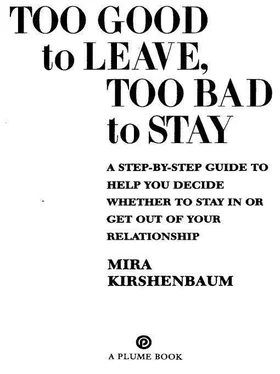Kirshenbaum, Mira - Too Good to Leave, Too Bad to Stay
Здесь есть возможность читать онлайн «Kirshenbaum, Mira - Too Good to Leave, Too Bad to Stay» весь текст электронной книги совершенно бесплатно (целиком полную версию без сокращений). В некоторых случаях можно слушать аудио, скачать через торрент в формате fb2 и присутствует краткое содержание. Жанр: Психология. Описание произведения, (предисловие) а так же отзывы посетителей доступны на портале библиотеки ЛибКат.
- Название:Too Good to Leave, Too Bad to Stay
- Автор:
- Жанр:
- Год:неизвестен
- ISBN:нет данных
- Рейтинг книги:3 / 5. Голосов: 1
-
Избранное:Добавить в избранное
- Отзывы:
-
Ваша оценка:
- 60
- 1
- 2
- 3
- 4
- 5
Too Good to Leave, Too Bad to Stay: краткое содержание, описание и аннотация
Предлагаем к чтению аннотацию, описание, краткое содержание или предисловие (зависит от того, что написал сам автор книги «Too Good to Leave, Too Bad to Stay»). Если вы не нашли необходимую информацию о книге — напишите в комментариях, мы постараемся отыскать её.
Too Good to Leave, Too Bad to Stay — читать онлайн бесплатно полную книгу (весь текст) целиком
Ниже представлен текст книги, разбитый по страницам. Система сохранения места последней прочитанной страницы, позволяет с удобством читать онлайн бесплатно книгу «Too Good to Leave, Too Bad to Stay», без необходимости каждый раз заново искать на чём Вы остановились. Поставьте закладку, и сможете в любой момент перейти на страницу, на которой закончили чтение.
Интервал:
Закладка:
In a sense all this says is that people can learn what they don’t know, but to learn what they think is wrong is impossible.
The last two guidelines have something in common. Both focus on ways it’s not safe to get close. Guideline #32 focused on how it’s not safe to get close because that’s when you get attacked. Guideline #33 focused on how it’s not safe to get close because that’s when your vision of closeness gets attacked.
STEP #34: ARE WE HAVING FUN YET?
Let’s be clear about why we’re talking about intimacy. It’s not because you’re supposed to live up to some therapist’s theory of what it’s like for two people to be together. It’s because being together is supposed to feel good. We’ve talked about intimacy because it’s certainly supposed to feel good when you’re closest.
It should also feel good the rest of the time. But how good? And good in what way? And when does not feeling good mean that the relationship is too bad to stay in?
It should come as no surprise, of course, that the thirty-three questions you’ve gone through up until now have eliminated most of the ways a relationship feels so bad it’s too bad to stay in. So we’re in subtle territory here.
And in this territory what people complain about most is boredom. The deadly dullness and predictability of your interactions from morning till night. Where you know exactly what the other’s going to say and yet you’re still ready to scream at the thought of hearing him say it.
And yet, just the way you’ve learned to be mature and accept the fact that a good-enough relationship has fights from time to time and frustrations over intimacy, so, too, does boredom become an inevitable part of two people growing old together or even being together for the first six months. And I know very few divorcing couples where both partners don’t envy old bored married couples. At least they’re not hating each other. At least their relationship is enduring. At least they’re sharing a history.
Still, you’ve got to draw the line somewhere. There’s some degree of cold, empty boredom that makes being alone seem attractive. Based on my experience with people wrestling with this very issue, here’s the question to ask yourself:
Diagnostic question #34. Does your relationship support your having fun together?
This doesn’t ask if the two of you have a wild fun time every moment you spend together. It doesn’t even ask bow often you have fun together. It doesn’t even ask how much fun you have when you have fun together. It just asks whether you feel confident that, if the spirit somehow moved you and your partner, you could somehow stimulate and motivate each other into an experience where you had some fun.
Even if you just sit there like two bumps on a log watching television most evenings because you’re too tired when you get home from work to do much else, do you still have the fantasy and the belief that with one word from you and another word from your partner the two of you could be laughing and joking and fooling around? Or just walking out of the house and going out and having a good time?
I know you don’t feel this happens often enough. But do you feel the potential is there if the circumstances were right?
People in relationships complain about boredom and bickering. But here’s the guideline:
GUIDELINE #34
If you feel that you and your partner have turned a corner where having fun together is simply not a possibility at all, and you’re living without hope of the two of you having fun together again, then most people in your situation are happy they leave and unhappy they stay. If the possibility of fun between you does seem fully alive, then that’s a sign your relationship is too good to leave. Quick take: Fun is the glue of love.
Before we go any further, I’ve got to talk about what it means to have fun. It means, of course, what it means to you for you to have fun. You’re the standard. If sitting on the porch gossiping about the neighbors as they go by is fun for you, then that’s your fun. If tickling each other until your sides hurt is fun for you, then that’s your fun. If having long complicated arguments about federal budget priorities is fun for you, then that’s your fun. If having sex is fun for you, then that’s your fun and your sex all in one.
And people don’t only vary in what it means for them to have fun but in their need for fun. Just the way some people need wild, exotic sex three times a day and other people are content having sex once in a while, some people are satisfied with a level and frequency of fun that would seem very gray to other people. I think of myself, for example, as fun loving, and compared to some therapists I know I think I am, but my kids don’t think I have enough fun at all.
So you set the standard. I just want you to be able to give yourself permission to see that your relationship is too bad to stay in if it’s the case that there’s no more possibility for you to have fun in it, as well as realizing that your relationship may be too good to leave if you still can easily have fun together.
Intimacy and Fun
If you want to see how important fun is for the basic satisfaction-producing core of a relationship, you might have noticed I didn’t say people were happy leaving when they weren’t close. Even though intimacy’s important, with time and age a relationship can still feel satisfying without an incredible special closeness between the partners. They might wish they had more closeness, but they’re not going to be happy they leave just because they don’t have that closeness.
But in some special way the possibility of fun is more important in the long run than holding on to that last degree of closeness. Let me put it like this. People who were close to each other but who’d lost the possibility of having fun together were a lot more unhappy and a lot more content to end their relationship than people who wished they were closer to each other but still felt the possibility of fun was alive in their relationship.
Whatever fun is for you, fun is the orgasm of intimacy.
18
I’ve Got You Under My Skin
Issue: Feeling You Belong Together
STEP #35: A REASON TO BE TOGETHER
If you remember back to when you were in elementary school if one of your friends ever thought you liked someone they’d immediately tease you with the poem:
John and Mary, sitting in a tree,
K-I-S-S-I-N-G.
First comes love, then comes marriage,
Then comes Mary with a baby carriage.
Now answer this. Why “sitting in a tree”? How did falling in love put the two of you in a tree?
Because you fall out of trees. And you fall out of love. That’s one of the eternal mysteries of love. How you can fall in love and then out of it again?
And in a horribly frustrating way, the strength of your passion (shall we say, the height of the tree your love has allowed you to sit in) is no protection against your falling out of love. Little passions and grand passions are equally likely to dump you on the ground.
Of course by the time marriage and a baby carriage follow love, you’re pretty much stuck up the tree and you don’t have to worry every minute about falling out of it. Still, you’d like some protection. You’d particularly like this protection if you’re someone who’s been wondering about leaving your relationship because sometimes it’s felt too bad to stay in. What if you’re sitting in the tree of love and there’s nothing to hold you up? When love itself seems shaky, is there anything else that can hold you together?
There is protection for some people and you deserve to know about it. For some people in some relationships there’s a kind of superglue holding them up in the tree of love, beyond love itself. It varies widely in its exact form from person to person. But to see if you’ve got it (and it doesn’t mean anything bad if you don’t have it) ask yourself this question:
Читать дальшеИнтервал:
Закладка:
Похожие книги на «Too Good to Leave, Too Bad to Stay»
Представляем Вашему вниманию похожие книги на «Too Good to Leave, Too Bad to Stay» списком для выбора. Мы отобрали схожую по названию и смыслу литературу в надежде предоставить читателям больше вариантов отыскать новые, интересные, ещё непрочитанные произведения.
Обсуждение, отзывы о книге «Too Good to Leave, Too Bad to Stay» и просто собственные мнения читателей. Оставьте ваши комментарии, напишите, что Вы думаете о произведении, его смысле или главных героях. Укажите что конкретно понравилось, а что нет, и почему Вы так считаете.












